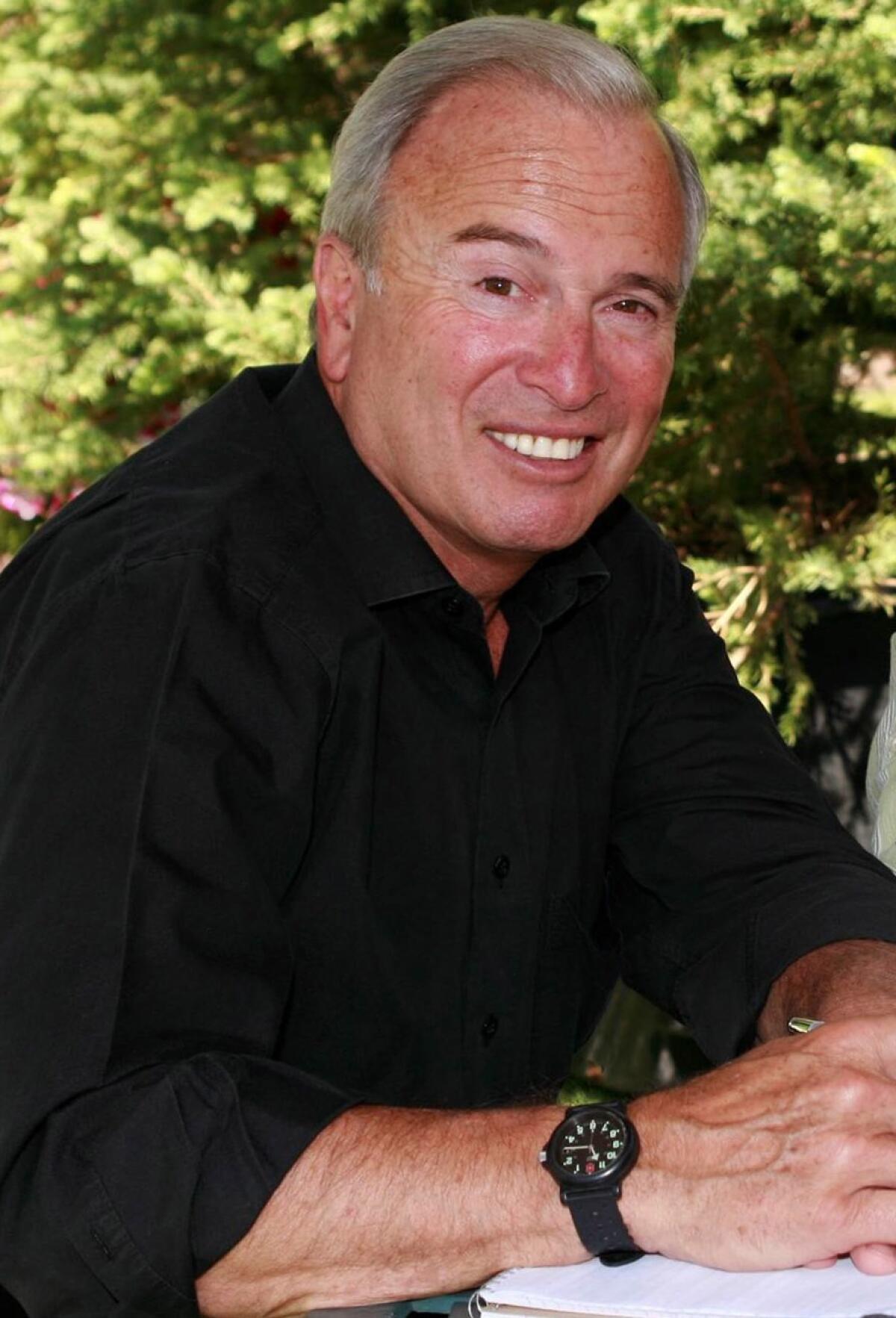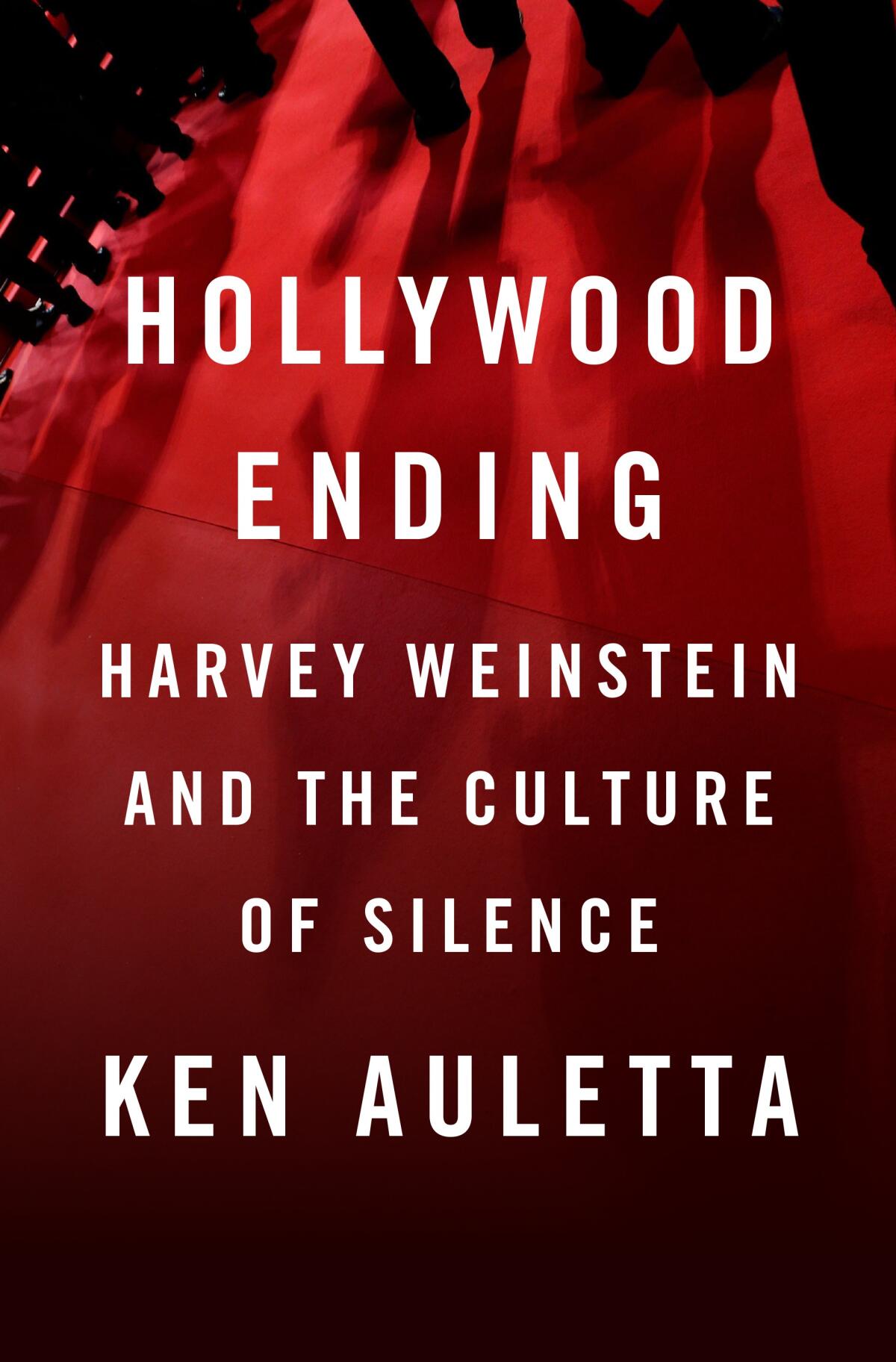Ken Auletta was scooped on Harvey Weinstein. But he wasn’t done — until now

- Share via
On the Shelf
Hollywood Ending: Harvey Weinstein and the Culture of Silence
By Ken Auletta
Penguin: 480 pages, $30
If you buy books linked on our site, The Times may earn a commission from Bookshop.org, whose fees support independent bookstores.
In 2002, author and New Yorker media reporter Ken Auletta was hard at work on a profile of Harvey Weinstein. He knew the Miramax honcho was a bully, prone to violent outbursts, and that he was an abuser of women. He also had reason to believe Weinstein was a rapist. But he couldn’t get any of the alleged victims to go on the record. Auletta and New Yorker editor David Remnick decided they didn’t have the goods. “We’re not the National Enquirer,” Auletta said in a recent phone interview. “At that point, it was hearsay.” The profile ran without the rape allegations.
Twenty long years later, Weinstein, 70, is now behind bars after a New York jury found him guilty of rape and sexual assault in 2020; he awaits another trial in Los Angeles on similar charges. The three reporters who broke the story open, Megan Twohey and Jodi Kantor of the New York Times and Ronan Farrow of the New Yorker, shared the 2018 Pulitzer Prize for public service. Other sexual predators, including Bill Cosby and Roger Ailes, have been exposed. The #MeToo movement has brought a widespread reckoning.
But Auletta, now 80, was never done with Weinstein. His new book, “Hollywood Ending: Harvey Weinstein and the Culture of Silence,” out Tuesday, is a biography in full, tracing Weinstein’s youth in Queens, his early career as a music promoter in Buffalo, his life as a Hollywood power broker and his history of sexual predation and assault.
Reached by phone from his home in the Hamptons, Auletta wasn’t so much resigned to having failed to break the story as delighted that others finally had.
He gives “the greatest credit” to Kantor, Twohey and Farrow “for getting women to feel comfortable enough to talk. The fact that they were empathetic enough to make them feel comfortable is a great tribute to them. They deserve the credit, as well as the women who dared come forward after all the years they did not.”
“Catch and Kill,” released Tuesday, is equal parts memoir, spy story and portrait of perseverance under terrible circumstances.
Auletta was no mere bystander, however. The longtime media journalist, whose previous books cover subjects ranging from the television networks (“Three Blind Mice”) to the fall of Lehman Brothers (“Greed and Glory on Wall Street”), helped in several ways to accelerate Weinstein’s downfall.
In 2017, Farrow, then working for NBC News, came to Auletta and requested access to the reporter’s papers and recordings. Farrow claimed he had multiple women accusing Weinstein of rape on the record. Auletta was excited. He did worry the younger reporter “might be a bit of a zealot”; Farrow had led the charge against his father, Woody Allen, amid allegations he’d molested Farrow’s sister, Dylan. But a conversation persuaded him Farrow was “serious and careful, and judicious.” He granted permission and even sat for an interview.

When Farrow’s NBC bosses, including current NBC News head Noah Oppenheim, famously killed the story, it was Auletta who set up a meeting with Farrow and Remnick — and set Farrow up for his earth-shattering story. The rest was #MeToo history.
Except, for Auletta, it wasn’t. He still had questions.
“I was thrilled that they finally had nailed this guy,” Auletta says. “But I was really curious what made Harvey Weinstein the sexual monster he became. How could a guy who was so beastly to women be so talented in picking artful movies? I was interested in exploring why, for four decades, people who knew or should have known he had abused women were silent. How did they enable him? Those were some of the things that I was interested in exploring in a book.”
Various patterns emerge in “Hollywood Ending,” for which Auletta interviewed more than 200 people. The culture of enabling at Miramax is among the most troubling. Time and again, Weinstein’s assistants, many of them women, led young actors and models to Weinstein’s hotel suites for alleged meetings. Once inside, these young women were often faced with a naked Weinstein — demanding massages, shooting himself up with drugs to get an erection and physically overpowering his prey. Did Weinstein’s assistants know exactly what was going on? They certainly knew something. They also knew they wanted to keep their high-paying jobs and access to the pinnacles of the movie business.
If you want to know how powerful men get away with abusing people for years, read “She Said.”
Much of “Hollywood Ending” boils down to one of Auletta’s favorite subjects: power. Weinstein wasn’t just some random ogre. Together with his brother, Bob, who claims he knew nothing about the assaults, he built an empire of films known for originality and flair. “Pulp Fiction,” “My Left Foot,” “The Crying Game,” “sex, lies and videotape,” “Good Will Hunting”: Weinstein bankrolled movies that won awards and great reviews and sometimes even made money. (Bob’s genre movie label, Dimension, was a more consistent box office winner.) Miramax had prestige. Weinstein spoke the language of cinema, which made him stand out from his more corporate-minded competition. He was someone you had to listen to when he offered favors, someone you’d be scared to anger and eager to coddle.
As Auletta reports in the book, when Premiere reporter John Connolly heard that Weinstein allegedly raped a former assistant at the Venice Film Festival, Weinstein told him there was nothing to the rumor. Connolly told Weinstein he believed him. He also ended up signing a $500,000 contract with the Miramax publishing imprint, Talk Books, to write a book about Bill Clinton (also a friend of Harvey’s).
“Harvey knew how to play the levers of power and people,” Auletta says. “Clearly reporters should have done more to pursue the story of Harvey’s abuse of women. There were rumors out there, but people who covered him in Hollywood were invited to his screenings, and they were naturally sympathetic to the underdog taking on the big guys. He wasn’t even in Hollywood; he was in New York. And they liked that too.”
Auletta may not have cracked the case, but his book provides context that brings the Weinstein saga into sharp focus. It puts dozens of interviews between covers, pressing a range of enablers on the record about what they knew and when they knew it. It pulls back for the wide angle with the benefit of time, and a wealth of now-public reporting, examining the systems that allowed Weinstein to run wild and damage lives. And in showing the producer from his earliest years, it reminds the reader that the monster is also a person. In all these ways, “Hollywood Ending” concludes an endeavor that began some 20 years ago, when Auletta couldn’t quite get the goods.
Police said the alleged offenses took place in London in 1996. Britain does not have a statute of limitations for rape or sexual assault.
Vognar is a freelance writer based in Houston.
More to Read
Sign up for our Book Club newsletter
Get the latest news, events and more from the Los Angeles Times Book Club, and help us get L.A. reading and talking.
You may occasionally receive promotional content from the Los Angeles Times.










